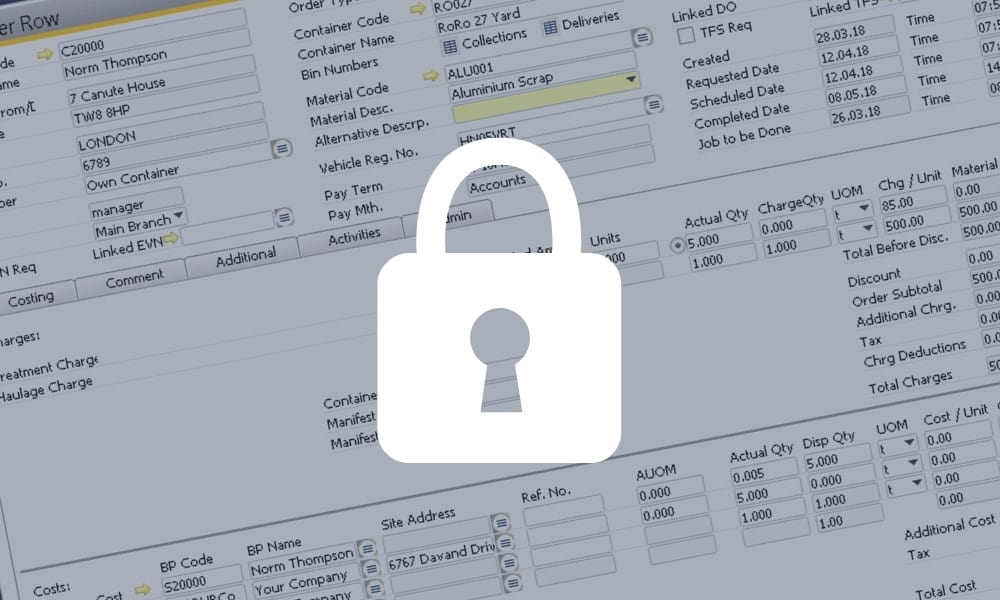Ensuring Waste Management Regulatory Compliance
We explore the steps you can take to ensure your waste and recycling management processes are legal, compliant and easy to report on.

We explore the steps you can take to ensure your waste and recycling management processes are legal, compliant and easy to report on.
Are you at risk of failing to meet your legislative and regulatory compliance obligations? Waste Management and Recycling companies need to report on so many different areas to internal and governmental bodies.
With good software in place, internal and external reporting is made much easier, removing manual operation, saving time and increasing accuracy.
We’ve designed Waste and Recycling One so that you can quickly generate the reports needed, confident in their accuracy.
There are a number of laws governing waste disposal. You also have additional legal responsibilities if you are dealing with hazardous waste. These laws include: classifying waste, moving waste, waste permits, and licences, storing waste, using waste and disposing of waste.
There are also specific regulations for different types of waste. For example, batteries, electrical, packaging, or radioactive waste. Waste Recycling One includes tools designed to help you track and manage your processes for easier compliance management.
We have developed Waste & Recycling One to manage different modes of waste transport when moving resource materials. Comprehensive master data details materials, methods, use of internal assets, and subcontractor management for efficient, cost-effective, and traceable waste materials’ logistics processes. This brings huge benefits in time efficiency and reporting accuracy.

Feedstock Security: Manage the planning, instruction, contract, acceptance, quality, and compliance of raw materials into recycling operations. Confirming the resource feedstock, weight validations, and service level agreements.
Quality & Compliance Control: Record the characteristics, components, and quality of batches of hazardous and non-hazardous materials. Pre-acceptance and laboratory sampling into production are managed by a variety of configurable process tasks and activities.
Materials Compliance: Ensure compliance of materials within contract and service level agreements. Ordering, laboratory sampling, characteristics and composition, percentage yields, quality assurance checks, goods, issues, receipts, production processes, and inventory protocols.
Materials Yields: Manage sophisticated hazardous and non-hazardous raw materials through intricate reprocessing, refurbishing, and disposal processes. Quality assurance, inventory, warehouse and bin location, parent, child, characteristics, composition, batches, serial numbers, and yields all maintain the quality of input, traceability and grade of output.
Circular Economy: Manage the value of inorganic compounds and organic materials flow in open and closed-loop supply chain models. Trace material batch, characteristics, components, products, and material yields through mass balance reporting. Provide, laboratory, QA, inventory, production, serial number, and asset lifecycle management.

Data is critical but must be held in ways that comply with regulations. We explore the steps you can take to ensure your data storage is legal and compliant.
Data is becoming more useful to companies, with the introduction of advanced analytics and insights, such as those that our waste management software solution, Waste and Recycling One, provide. But companies must ensure it is stored in a compliant manner. What steps can you take to ensure data storage complies with the regulations?
Consolidate: If you are using a mix of legacy systems, chances are that it is difficult to compare data. By consolidating all of these platforms, into one simplified, solution – such as by using Waste and Recycling One – you can manage this data better. This will make it easier to comply with Subject Access Requests under GDPR, and execute a Right to be Forgotten.
Analyse: Any data storage systems that predate current regulations may contain information that you are now required to protect, such as sensitive personal information. Some of the data may now be obsolete, and so posing an unnecessary risk to your business. A thorough analysis of the data you hold in reference to the current legislation is wise.
Use: Your legacy data may hold valuable insights into your business, that can help drive improvements. If you were able to consolidate this with your other data by transferring it into a common format, smart analysis tools could be employed to look for trends and insights into your processes.

There are a number of acts and regulations that mean the data you store on individuals has to be held and used correctly.
Across your waste management processes, you are likely to have multiple repositories where customer data is held. Some data may sit on legacy platforms that you no longer want to maintain and in formats that are not secure. These data repositories hold a potential risk of not meeting recent regulatory changes.
There are a number of acts and regulations that protect an individual’s rights for data about them that can be stored or disclosed, such as Article 8 of the Human Rights Act 1998, which gives you the right of respect for your family and private life, including how your personal information is held and protected. UK law governs these areas with the following regulations and Acts:
– General Data Protection Regulation (GDPR)
There are also standards and policies set up by industry members such as:
– The Payment Card Industry Data Security Standard (PCI DSS)
